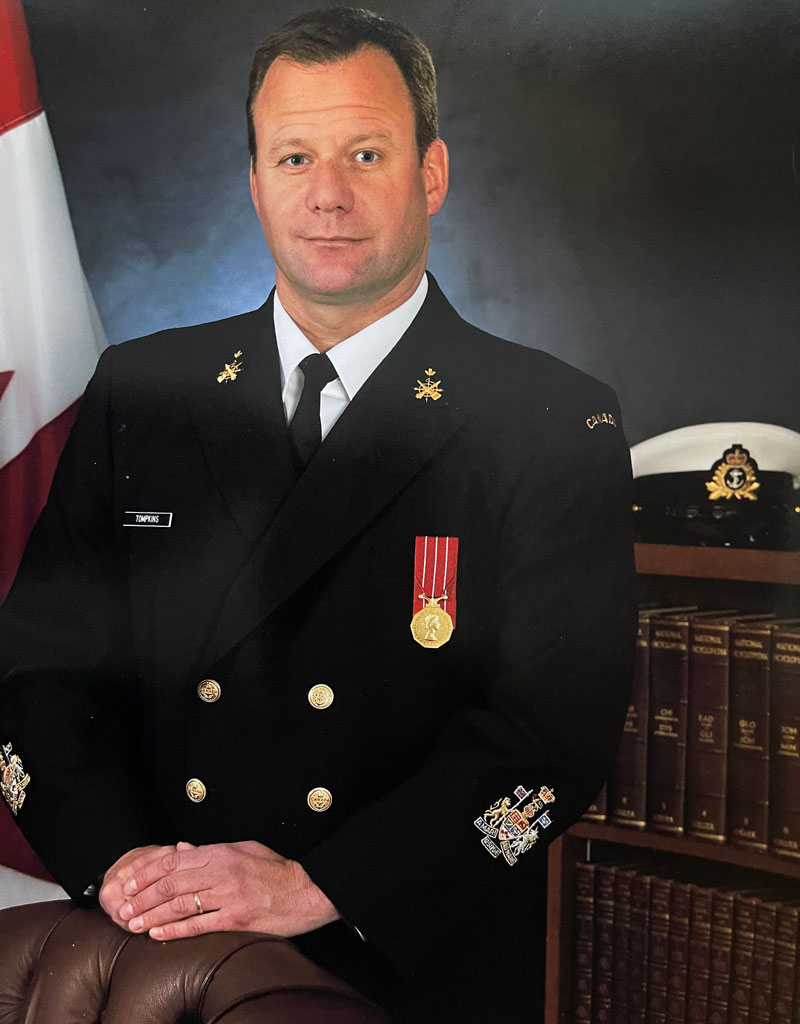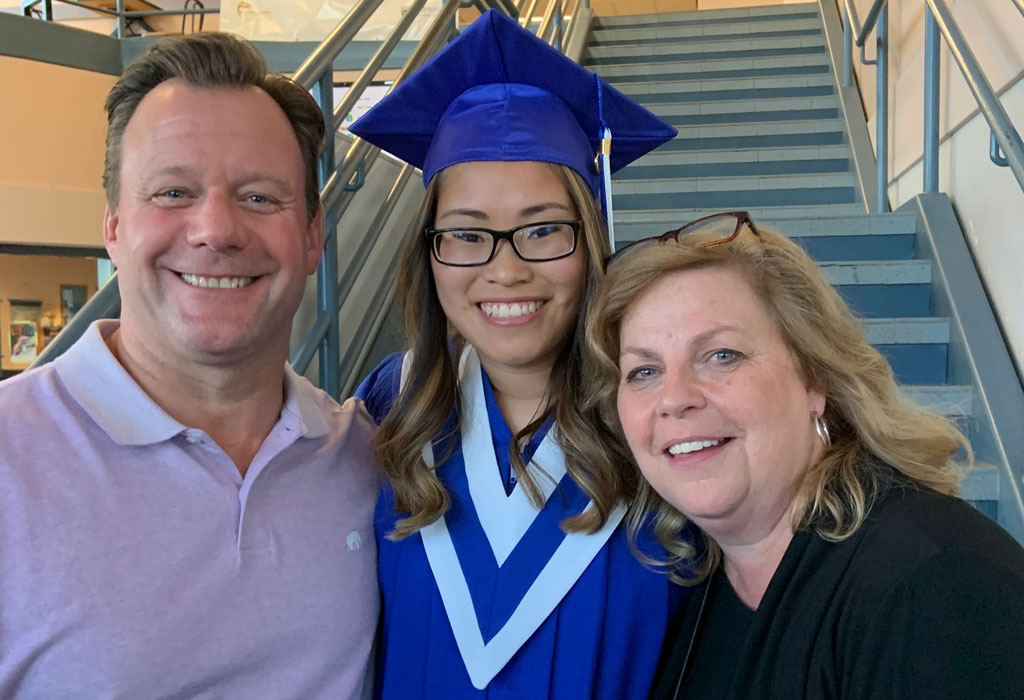When Yorkville University’s Ryan Tompkins sat down to pick a name for his private counselling practice, the 23-year veteran of the Canadian Forces knew just where to look for inspiration – a much-loved phrase from his days in the Navy.

“‘Fair winds and following seas’ is a military term that basically means, ‘May the seas be light for you,’” the Doctor of Counselling and Psychotherapy student said of the meaning behind Fair Winds Traumatic Stress Services.
“It seemed fitting, because I work with all trauma clients – domestic violence and sexual assault survivors, as well as first responders, veterans and current military.”
Inspired by military service
It was during his dealings with that latter category of client, in fact, that Tompkins was first inspired to pursue counselling as his post-Navy second career.
A Chief Petty Officer 1st Class upon his retirement in 2011, the Vancouver native took on a number of roles overseeing leadership training nearing the end of his time in the military. It was then that he began to see a troubling pattern in some of the sailors he was supervising.
“It was a pattern of agitation, emotional outbursts, and an inability to follow directions. Some people also had some pretty significant alcohol use,” he said, noting that all those impacted had either been deployed to the Balkans area in the mid to late 90s or had served in Afghanistan.
“We didn’t know what we were seeing at the time, but it was post-traumatic stress. Working with them, I started to get really interested in human behaviour, psychology, and the supports that were being offered to veterans.”

Just 45 when he officially retired from the Navy, the married father of one began seeking out both educational and job opportunities in line with his newfound passion right away.
While studying towards his Bachelor of Social Work degree at Vancouver Island University, he found work in 2013 at an addiction and mental health treatment centre in Nanaimo called Edgewood Health Network.
“That was my first foray into counselling, and I gained a ton of experience in my first three years there. But I still had this passion for trauma, and looking really specifically at post-traumatic stress with veterans and first responders,” he explained.
“So, I advocated strongly for a trauma program at Edgewood, and was part of a team of three that built, and then implemented a concurrent trauma and addiction program specifically tailored to first responders.”
Return to school
During his time at Edgewood, after graduating with his BSW, Tompkins decided to enroll in the Master of Arts in Counselling Psychology program at Yorkville University in 2015.
“I loved it, even though I was working full time in frontline addiction treatment at the same time. It was a lot, but I stuck it out and finished my masters in December of 2017,” he said, noting his fortune at having faculty member Dr. Rob Roughley as his practicum supervisor.

“He instilled a lot of real integrity in me around the profession of counselling and reflectivity, and all these really strong self-reflection tendencies and ways of being a counsellor.”
At around the same time Tompkins was getting ready to graduate with his Masters in 2017, he began hearing whispers that Yorkville was in the midst of developing a doctorate program. But after six straight years of balancing his full-time work with his university studies and family life with his wife Cathy and daughter Quinn, Tompkins was ready to take some time off school.
Fast-forward three years later, however, and Tompkins was ready to return to his alma mater to take on his doctorate as part of Yorkville’s inaugural Doctor of Counselling and Psychotherapy cohort.
Launched this past September 2020, this first-of-its-kind online program offers a practitioner-oriented degree designed to equip students with the knowledge and skills required to help define counselling and psychotherapy as a profession distinct from other mental health and helping professions.
As soon as Tompkins began the program, he knew it was going to be the right fit for him.
“Although it’s a lot different than I thought it was going to be, it has been exactly what I needed at this professional moment and exactly where I need to be,” he said, lauding the Doctor of Counselling and Psychotherapy program for its focus on reflective practice.
“It’s resonated so strongly with me because I work in the profession, and one of the biggest issues in this profession is a lack of self-reflection…In my experience, one of the most profoundly important parts of counselling is being reflective of what’s happening to us and our bias, and we’re in that process right now.”
Virtual mentoring
In his Doctoral Case Conference course, for example, Tompkins and a small group of classmates meet virtually every Tuesday for mentoring sessions with professor Yvonne Hindes – an exercise Tompkins characterizes as “the single most important thing I’ve done in my professional career in the last 10 years.”
Over the course of each hourlong weekly session, one student presents the case of an anonymous client they’re currently working with and then opens the floor to discussion about that case.
“It’s been amazing having all these people who are in the profession and coming from different backgrounds challenging each other to think outside of our normal ways of thinking.”
– Ryan Tompkins, Doctor of Counselling & Psychotherapy student
While Tompkins’ specialty is trauma, the other members of his mentorship group come from various backgrounds – including a nurse who provides on-campus counselling to nursing students; an occupational therapist who’s also a counsellor; and a palliative care specialist who works in a hospice setting.
“Having all these differing perspectives coming together has been pretty amazing. It’s such a rich environment for us to not only provide insight into our thoughts and process, but also to get feedback on that,” he enthused.
“You get all this input that’s something you may not have thought about before, which is pretty amazing.”
Once Tompkins has completed his doctorate, his ultimate goal is to work more exclusively with trauma clients – especially those coming from a military background.
“I have a very strong connection to veterans, because I understand where they’re coming from. I understand what it means for them to leave their families. I understand what it means to do things without question. I understand that culture,” he explained.
“When you’re in the military or you’re a veteran, there’s language that you use that most people don’t know. So, to have someone like me as their counsellor, someone they can relate to on that level, creates a very trusting relationship quite quickly. They realize, ‘Okay, this guy has spent 23 years doing exactly what I’m doing, so he understands.’ And that’s incredibly rewarding.”






